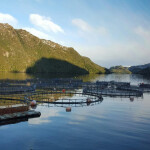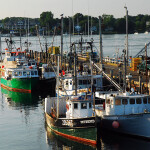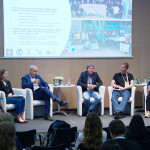The eruption of the Calbuco volcano in Chile last Wednesday has damaged salmon farms and is forcing producers in the affected area known as Region X to relocate some of their hatchery operations, with some reporting destruction and production losses.
SalmonChile has estimated that in the volcano danger zone, a 20-kilometer radius from the volcano, there are some 25 million fish (fry and smolts), representing just over 8 percent of the total production of Atlantic salmon and coho salmon in freshwater facilities. About 4 percent of the country’s fish farms are in the operating zone, the organization said, with companies like Marine Harvest and Cermaq keenly affected.
Marine Harvest has confirmed significant fish losses at its two sites located within the exclusion zone, put in place by Chile’s national emergency office ONEMI. Rio Blanco is a freshwater hatchery handling eggs and producing fry, while Copihue is a broodstock facility.
The Norway-based salmon farming giant said all of its employees affected by the eruption were safe and uninjured, but that 6.8 million fry, 2.4 million eyed eggs and around 3,700 broodstock were lost.
“We have clearly defined emergency routines in place for such potential events, and are pleased to see that our staff have responded well in the current unfortunate circumstances,” it said in a statement. “We are currently in close dialogue with our insurance supplier. Our preliminary assessment is that insurance proceeds related to physical assets will exceed asset net book values. In addition, we have insurance coverage of our biomass. We are in discussion with our insurance provider if the recorded value qualifies for full recovery. The outcome of such discussions is at this stage uncertain.”
The company said its stocking plans and expected harvest volumes for 2015 and 2016 would not be affected by the events and that its seawater operations in Region X and Region XI had not been impacted by the eruption.
Cermaq also confirmed that it lost its 2015 stocking generation of coho salmon, a situation CEO Jon Hindar called “unfortunate,” but one tempered by the fact that all of the company’s employees and their families are safe.
Cooke Aquaculture’s operations in Chile were unaffected, a company spokesperson told SeafoodSource, but it will “continue to assess the immediate and long-term impact from an industry perspective and cooperate with our industry colleagues who have been impacted.”
The full picture of the damages are not yet known. Sernapesca, the National Fisheries and Aquaculture Service of Chile, has reported that it is assessing the potential transfers of fish, allowing the most urgent, accompanying transfer processes to safeguard the implementation of bio-security measures. There are 13 centers operating in the impact zone, it said.
“We have come to the President of the Republic to make an assessment of the situation on the ground so as to be able to generate all the necessary support and help to normalize the situation and we are working effectively to achieve this and meet all those situations urgency in the sector,” said Luis Felipe Cespedes, minister of the economy for Chile.
In a census taken last week, six farms reported losses, some of which were “substantial,” according to Eduardo Aguilera, regional director of Sernapesca Los Lagos, which was unable to establish the condition of all operations as access had been cut off. A total of 11.5 million fish had been transferred, while several fish-culture centers had been impacted by falling ash.
SalmonChile said there are 11 salmon hatcheries in the area near the volcano, and that four had suffered serious damages and losses of fish.
The true impact of the volcano, Salmon Chile said, might not be felt until late 2016, when most of the juvenile fish would be reaching market size.
Chile is the second largest salmon producer in the world, after Norway. Chilean salmon go to more than 70 markets worldwide, and is the country’s second largest export product after copper.
Article includes reports from Contributing Editor Jason Holland





